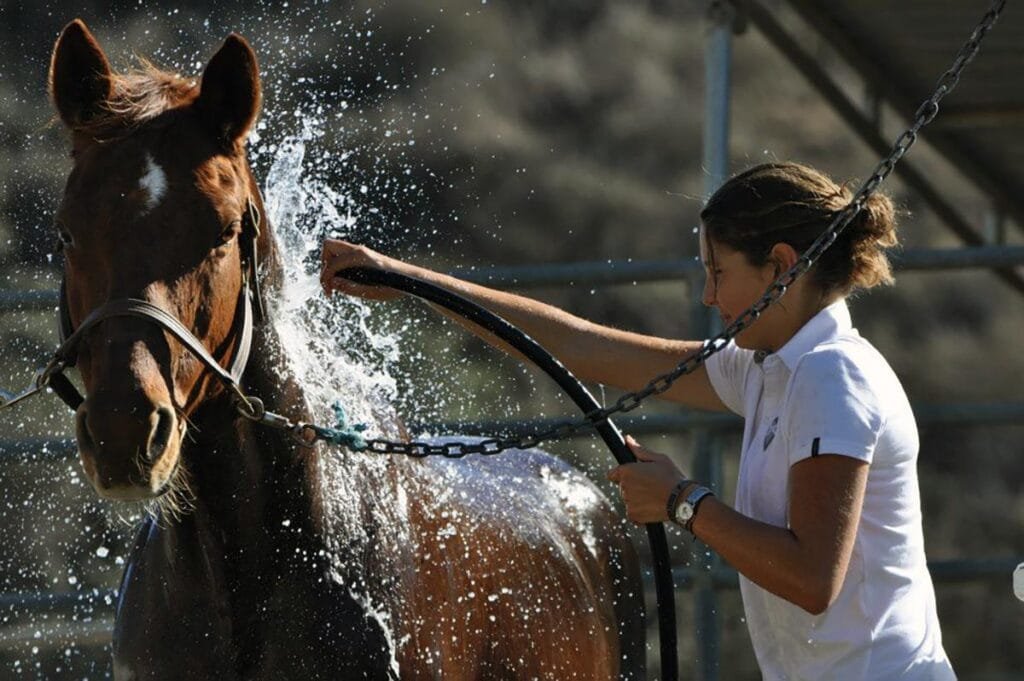Bathing your horse in the winter might seem like a good idea, especially after a muddy or sweaty ride,
But it’s important to carefully consider several factors before you decide to bathe your horse during the colder months. In winter, the weather and your horse’s needs change, and bathing can lead to unintended consequences if not done properly. Here are the key factors to think about before bathing your horse in the winter.
1. Temperature
The most important consideration is the temperature. Horses can get chilled easily in cold weather, especially if they’re wet. Bathing a horse when it’s too cold can lead to them becoming hypothermic, which is dangerous. As a general rule, avoid bathing your horse if the temperature is below 45°F (7°C). If the temperature is above 45°F, you might be able to bathe your horse, but you must ensure they can dry off quickly.
2. Drying Time
After bathing your horse, it’s crucial that they dry off completely before being turned out or left outside. If your horse doesn’t dry fast enough, they could catch a chill. In winter, their natural coat won’t dry as quickly as it would in warmer months, which means they’ll stay cold for much longer. If you don’t have access to a warm, sheltered space to dry them off, it’s better to avoid bathing altogether.
3. Access to Shelter and Blankets
If you must bathe your horse in winter, ensure that you have access to a warm, dry area for them to stand in while drying off. A barn or stable is ideal. You may also need to blanket them after bathing to help keep them warm until they’re completely dry. Blankets can help prevent your horse from becoming chilled, especially if they have a thin or clipped coat.
4. Horse’s Coat Condition
Horses with thick winter coats or those that have been clipped may react differently to being bathed in the cold. Horses with thick winter coats take longer to dry and may not shed water as quickly, making them more vulnerable to becoming cold. Clipped horses, on the other hand, are more susceptible to getting cold and may need extra warmth after being bathed. Consider your horse’s coat before deciding to bathe them in winter.
5. Type of Water Used
If you’re bathing your horse with cold water in the winter, they may experience a shock to their system, which could be uncomfortable and even harmful. Using warm water (not hot) is a better option to avoid stressing your horse. However, be mindful of the temperature of the water to prevent burns or discomfort.
6. Health Considerations
If your horse is sick or has a compromised immune system, it’s best to avoid bathing them in winter. The shock of the cold and the prolonged drying time can weaken their system, making them more susceptible to illness. Horses that are healthy and well-groomed are better equipped to handle the stress of a winter bath.
7. Avoiding Dry Skin
Bathing your horse frequently in winter can strip the natural oils from their skin and coat, potentially causing dry, flaky skin. The dry winter air can also contribute to skin issues, so it’s essential to avoid over-bathing. If your horse gets dirty or sweaty, consider spot cleaning with a damp cloth or sponge instead of giving them a full bath.
8. Weather Forecast
Before deciding to bathe your horse, check the weather forecast for the next 24-48 hours. If you expect a cold snap or rain, it’s not advisable to bathe your horse. You want to ensure that the weather will be warm enough to allow your horse to dry thoroughly, and that they won’t be exposed to harsh conditions immediately after the bath.
9. Alternatives to Bathing
Instead of a full bath, consider alternatives like:
- Spot cleaning: Use a damp sponge or cloth to clean specific areas.
- Use dry shampoo or grooming sprays: These can help freshen up your horse’s coat without the need for water.
- Rubber curry combs and grooming tools: These help remove dirt and debris while stimulating the natural oils in your horse’s coat.
10. Personal Comfort of the Groomer
Finally, remember that bathing a horse in winter can be uncomfortable for you as well. Standing in the cold water, especially if you don’t have a warm place to bathe your horse, can make the process difficult. Make sure you are prepared for the conditions and have the right gear, including warm gloves, waterproof boots, and layered clothing.
Conclusion
Bathing your horse in winter requires careful consideration of factors like temperature, drying time, and your horse’s overall health. If the weather is too cold, or you don’t have the proper equipment to dry them quickly, it’s best to avoid bathing. Instead, consider spot cleaning or using alternative grooming methods to keep your horse clean without exposing them to the risks of becoming chilled. If you do decide to bathe your horse, take all the necessary precautions to ensure they stay warm and healthy.




